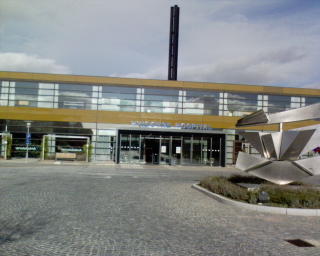extinct - languages
thoughts and notes on inventing a new alien language for literary use
site:www.ethnologue.com extinct - Google Search
It is 25 years since I did a do it yourself course in linguistics by ordering masses of books on inter-library loan
I taught myself Faeroese, when there was no dictionary to or from english available,
with help from an old Klaksvik farmer and a child's ABC and a bible, and in Tórshavn from a retired teacher and a course for native speakers of danish.
So I got to learn about Chomsky and grammars
start here http://en.wikipedia.org/wiki/Chomsky_hierarchy
eg
They generate exactly all languages that can be recognized by a Turing machine
then look at
Post-Chomsky's linguistics
Morphology (Cambridge Textbooks in Linguistics) 2nd Edition (Paperback)
by Peter H. Matthews, S. R. Anderson (Series Editor), J. Bresnan (Series Editor), B. Comrie (Series Editor), W. Dressler (Series Editor), C. J. Ewen (Series Editor) "In the traditional view of language, words are put together to form sentences..." (more)
If you develope an instinct for morphology you can see if a word belongs to a language or not
googling onwards:-
Distributed Morphology
A complete overview of the theory of the architecture of grammar.
www.ling.upenn.edu/~rnoyer/dm/
Distributed Morphology:
Frequently Asked Questions List
so START WITH
http://www.answers.com/morpheme
eg
In linguistics, a morpheme is the smallest language unit that carries a semantic interpretation. Morphemes are, generally, a distinctive collocation of phonemes (as the free form pin or the bound form -s of pins) having no smaller meaningful members.
English example: The word "unbelievable" has three morphemes "un-", (negatory) a bound morpheme, "-believe-" a free morpheme, and "-able". "un-" is also a prefix, "-able" is a suffix. Both are affixes.
As a genealogist and family historian specialising in Scandinavian links to USA for example
I often have to sort out mis-spelled place names in Denmark
So after learning danish for 25 yeasr I instinctively recognise non-danish morphemes in a US english version of a danish surname or place name.
JURGEN STRUMSHOLT is a US version of Jørgen Strømsholt
AKA Otto Stromholt in Phoenix USA
finding him in the Ellis Island database took weeks
Remember that english is a subset of the sounds a baby can do
and listen for example to some tapes of bushmen language, early all clicks,
which you will have difficulty hearing the subtilties of, let alone reproducing or writng them down.
eg googling
phoneme bushman click
Kung Bushman language, which is now known to exceed Ubykh by 34 consonants. ...
The Bushmen or San peoples of South Africa and neighbouring Botswana and Namibia, who live in the Kalahari, are part of the Khoisan group and are related to the Khoikhoi. However, they only recently have agreed on a collective name for themselves: ABATHWA. They have a manual communication system that they use while hunting.
http://www.google.com/search?hl=en&q=ABATHWA.&btnG=Google+Search
Pan South African Language Board has said:-
Abathwa and Seroa are only two of the African languages that have already become
extinct.
so rather than invent new why not preserve an old as a literary device
compare LATIN
no longer a family language anywhere
but still useful
see also
http://www.ethnologue.com/
lists many lost languages
thoughts and notes on inventing a new alien language for literary use
site:www.ethnologue.com extinct - Google Search
It is 25 years since I did a do it yourself course in linguistics by ordering masses of books on inter-library loan
I taught myself Faeroese, when there was no dictionary to or from english available,
with help from an old Klaksvik farmer and a child's ABC and a bible, and in Tórshavn from a retired teacher and a course for native speakers of danish.
So I got to learn about Chomsky and grammars
start here http://en.wikipedia.org/wiki/Chomsky_hierarchy
eg
They generate exactly all languages that can be recognized by a Turing machine
then look at
Post-Chomsky's linguistics
Morphology (Cambridge Textbooks in Linguistics) 2nd Edition (Paperback)
by Peter H. Matthews, S. R. Anderson (Series Editor), J. Bresnan (Series Editor), B. Comrie (Series Editor), W. Dressler (Series Editor), C. J. Ewen (Series Editor) "In the traditional view of language, words are put together to form sentences..." (more)
If you develope an instinct for morphology you can see if a word belongs to a language or not
googling onwards:-
Distributed Morphology
A complete overview of the theory of the architecture of grammar.
www.ling.upenn.edu/~rnoyer/dm/
Distributed Morphology:
Frequently Asked Questions List
so START WITH
http://www.answers.com/morpheme
eg
In linguistics, a morpheme is the smallest language unit that carries a semantic interpretation. Morphemes are, generally, a distinctive collocation of phonemes (as the free form pin or the bound form -s of pins) having no smaller meaningful members.
English example: The word "unbelievable" has three morphemes "un-", (negatory) a bound morpheme, "-believe-" a free morpheme, and "-able". "un-" is also a prefix, "-able" is a suffix. Both are affixes.
As a genealogist and family historian specialising in Scandinavian links to USA for example
I often have to sort out mis-spelled place names in Denmark
So after learning danish for 25 yeasr I instinctively recognise non-danish morphemes in a US english version of a danish surname or place name.
JURGEN STRUMSHOLT is a US version of Jørgen Strømsholt
AKA Otto Stromholt in Phoenix USA
finding him in the Ellis Island database took weeks
Remember that english is a subset of the sounds a baby can do
and listen for example to some tapes of bushmen language, early all clicks,
which you will have difficulty hearing the subtilties of, let alone reproducing or writng them down.
eg googling
phoneme bushman click
Kung Bushman language, which is now known to exceed Ubykh by 34 consonants. ...
The Bushmen or San peoples of South Africa and neighbouring Botswana and Namibia, who live in the Kalahari, are part of the Khoisan group and are related to the Khoikhoi. However, they only recently have agreed on a collective name for themselves: ABATHWA. They have a manual communication system that they use while hunting.
http://www.google.com/search?hl=en&q=ABATHWA.&btnG=Google+Search
Pan South African Language Board has said:-
Abathwa and Seroa are only two of the African languages that have already become
extinct.
so rather than invent new why not preserve an old as a literary device
compare LATIN
no longer a family language anywhere
but still useful
see also
http://www.ethnologue.com/
lists many lost languages
thoughts and notes on inventing a new alien language for literary use
 Hvidovre Hospital
Hvidovre Hospital 



